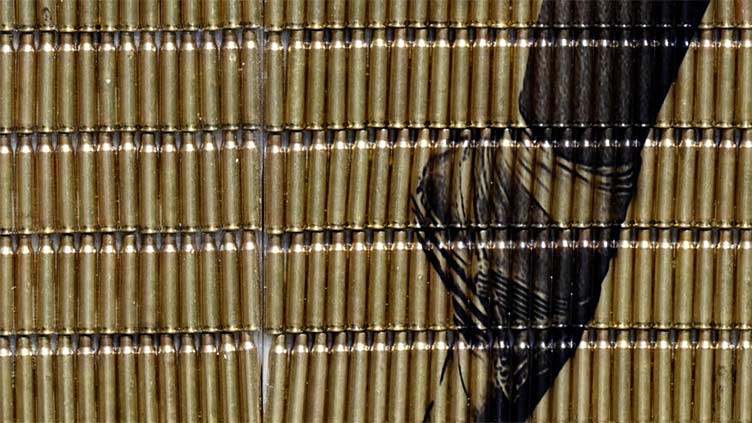'This is our reality': Ukraine artists depict the war

World
"What can you do against a tank with your art? Nothing," she said
Kyiv (Ukraine) (AFP) – When Russia invaded Ukraine, artist Zhanna Kadyrova felt her work was useless.
"What can you do against a tank with your art? Nothing," she said, sitting in her Kyiv studio.
But the 42-year-old changed her mind as galleries around the world snapped up her war-inspired work, raising funds to help civilians and soldiers.
The war has sparked huge interest in Ukrainian culture and contemporary artists are finding ways to highlight the horrors the country faces as well as explore ideas about its future.
Evacuating to rural western Ukraine without her usual studio and tools, Kadyrova spotted large stones smoothed by river water that resembled Ukrainian loaves of bread.
She shaped and sliced them and placed them on a table to create an installation called Palianytsia, a type of traditional wheat bread.
The name of the loaf has sparked numerous jokey memes. It is seen as impossible for non-Ukrainians to pronounce correctly and therefore a good way to spot Russian spies.
"We came up with this project in a second, and it exceeded all my expectations. I've already had about 40 exhibitions... I've just come back from India, I've been to Thailand, Taiwan, America, Europe," Kadyrova said.
"And, of course, after that my disappointment in art disappeared."
She talked frankly about the financial benefits, too, as she has used the money to help artists and soldiers and travelled to frontline areas to hand over aid.
"We made money like I've never made before," she said.
"We spend 100 percent of the money we get from Palianytsia on the army."
A Kyiv gallery is currently displaying her "Anxiety" series -- tapestries depicting kitsch flowers and cats, which she over-embroiders with air raid warnings.
An Orthodox priest looks at a creation made out of Russian missile fragments
An Orthodox priest looks at a creation made out of Russian missile fragments © Sergei SUPINSKY / AFP
The tapestries depict "the opposite of war", she said.
"When I add the inscription 'Air Alert' to this, I get a contrast. This is our reality."
Ballerina on bullets
Playing with similar contrasts, an image of a ballerina printed on bullet casings is on display outside the National Opera of Ukraine in central Kyiv.
Passers-by take selfies beside the installation, called "Unbroken Project".
"I think it's important to remind people that there is still a war going on," said one, Nadiya, an interior designer.
For this work, Ecuadorian Felipe Jacome, 37, photographed his collaborator Svitlana Onipko, 26, a Ukrainian ballerina now based in the Netherlands, using an UV-printer to transfer her image onto bullet casings mounted in resin.
Onipko danced at the National Opera of Ukraine before war broke out.
The photographers are selling smaller versions to raise money for war orphans and supplies for the front lines and have raised "over $50,000," Jacome said.
He watched as a pair of middle-aged men posed in front of the work, one holding a cigarette.
"The message is immediately understood by people here," he said.
He added the artists wanted to display their work "in different places in Europe and in the United States... to continue to shed light on the situation in Ukraine".
'Toxic ex'
Nearby in Kyiv's PinchukArtCentre gallery, 21-year-old Maksym Khodak was participating in a show by young artists.
For his installation, the video artist persuaded two prolific TikTok bloggers to travel with him to the war-torn eastern city of Kharkiv.
They spent a few days there in October, under regular shelling and with intermittent electricity and internet.
The bloggers, Roman and Viktoriya, came from western Ukraine and had not experienced such heavy fighting before.
"You know it's uncool. Lying in bed and at some point getting paranoid that you will be under shelling now," said Roman.
Made using the TikTok app, the resulting video work is displayed simultaneously on three separate screens.
They constantly stream memes such as ex-British prime minister Boris Johnson dancing with a lightsaber and games shooting Russian "orcs".
The group stayed in a building that was once home to avant-garde Soviet writers and artists who experimented with utopian ideas and were killed in Stalin-era repressions.
The building was shelled in March last year.
"I started to think about what the new political language can be -- basically how to speak with my generation," Khodak said.
He encouraged 20-something bloggers to talk in their own way about the future of Ukraine.
Viktoriya described Ukraine's "co-dependence" with Russia, while Roman likened it to "a toxic ex" who is "triggering you".
"We don't want to have anything to do with the past," he said.

